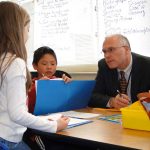“I came from Hartford and that I grew up just like they did, and I finished school and I have my doctorate. That’s an expectation. It’s not something that’s a far reach for them. I’m letting them know, no this is the norm. This is what you can do if you choose,” says Tayarisha Batchelor.
For Batchelor, leading the next generation of movers and shakers is her biggest achievement.
UConn 360’s Julie Bartucca talks with Professor Sandra Chafouleas about ways parents can support their kids during the uncertainty and stress of pandemic-era schooling.
In a newly published research study, Neag School Associate Professor Jennie Weiner and colleagues at several other universities examined the extent to which principals had created the sorts of conditions in their schools that support continued learning and teaching during the pandemic. Specifically, the researchers sought to understand how, and whether, principals were fostering something called “psychological safety” in their schools.
Paul Freeman ’09 Ed.D. is in his 10thyear as the superintendent of Guilford (Conn.) Public Schools and has almost 30 years of administrative and teaching experience in schools in Connecticut. Freeman earned an Ed.D. in 2009 from the Neag School of Education. In addition to having recently been named the state’s Superintendent of the Year by the Connecticut Association of Public School Superintendents (CAPSS), he had been recognized in 2014 by the Neag School as Outstanding Superintendent of the Year.
Connecticut education Commissioner Miguel Cardona will appear before the Senate’s education committee Wednesday for a hearing on his nomination to serve as the next U.S. education secretary under President Joe Biden.
UConn professor Casey Cobb, an education policy expert, said the hearing will provide an opportunity for Americans to learn more about Cardona’s priorities —especially since he only entered the public eye on a national scale in late December.
The University of Connecticut has been awarded a $179,000 grant from the US Department of Education’s Office of Postsecondary Education for a new research project centered on reimagining dual-language education. The project’s purpose is to improve the ability of dual-language programs to promote the equitable bilingualism and biliteracy development of all students through a greater focus on sociocultural competence.


